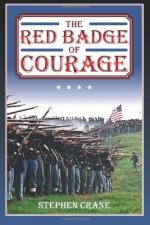|
|
The Red Badge of Courage Topic Tracking: Maturation
Topic Tracking: Maturation
Chapter 1
Maturation 1: The Red Badge of Courage is a story of a psychological growth into manhood, through the medium of war. The characters, for the most part, remain generic nameless and faceless portraits of men. Henry, the main character, is almost all the time referred to as either "The Youthful Soldier," or "The Youth." In the first chapter, Henry's first musings are a starting point for his psychological growth - his inexperienced thoughts are full of theoretical ideals. He has no idea about the "truth" of war or manhood, but can only speculate from his schooling and reading.
Chapter 2
Maturation 2: Comparing this example of Henry's internal dilemma to previous ones, a cyclical thread begins to form. The psychological debate in the novel takes on a redundant air early on and keeps that trend throughout. Henry keeps going back and forth, struggling between what he thinks at any given time and what his emotions are telling him to do. Here, he second guesses everything he has deemed right up to this point - his enlistment, his desire to leave home against his mother's wishes, etc.
Chapter 3
Maturation 3: This is another twist on Henry's cyclical mental torture. He is proceeding from one overwhelming emotion to the next: from excitement, to doubt, to adulation, to self-pity, to fear, and finally, to helpless defeat.
Chapter 5
Maturation 4: Although Henry remains thoroughly internal in his thinking, he becomes, for the first time, something more than a helpless individual, able only to compare himself relative to others. He enters a place where the larger ideal is more important than individual survival. The change is momentary, however - as happens time and time again in the novel, a psychological step forward is accompanied by a large step backward, as Henry follows up this realization by fleeing.
Chapter 8
Maturation 5: After his flight from battle, Henry still struggles with two opposing forces: what his conscious mind is telling him to do in the moment (to run), and what the instilled emotional ideals about war are telling him (to value a Greek notion of courage and valor). He first tries to justify his flight through natural means: his actions were purely an instinct to survive. Despite these justifications, he feels ashamed around the men who stayed in the battle long enough to be wounded. He is still a long way off from any inner reconciliation.
Chapter 10
Maturation 6: Although Henry seems to have made little headway on the inner maturity and courage he desires, he acknowledges that the societal pressures he feels are overwhelming to the point of superseding the desire for life itself. While the instinct to run, like the squirrel from the pine cone, is "natural" (and in that sense justifiable), competing social pressures are enough for Henry to face death willingly. The natural instinct to survive is overridden altogether - Henry actually feels as if he wants to be wounded, and that he wants to die. Such an outcome would be heroic in the eyes of others.
Chapter 14
Maturation 7: Henry first encounters the experiential manhood he has been struggling toward (albeit unknowingly). He sees new qualities in his friend that he perceives as good; he envies them and for the first time, sees a tangible glimpse of the inner strength he desires to find in himself.
Chapter 15
Maturation 8: Although the tone of this passage is still largely naïve and smacking of cocky, youthful inexperience, Henry has taken a turn for the better. He has seen the soft assurance of his friend Wilson, and is heading in that direction himself. His basis for the assurance he feels might be misplaced and founded on feelings of superiority, but Henry has undoubtedly undergone a huge psychological turn since he was first languishing in camp.
Chapter 17
Maturation 9: Henry comes to a major realization - that the mental boundaries and subsequent anguish he has put himself through were little more than that - mental boundaries. To this point, he has allowed his internal reflection to be mapped onto his perception of reality. When he thinks of the enemy as fierce, unstoppable beasts, he allows that belief to color his interpretation of events that transpire. Now, however, he realizes the discrepancy between belief and empirical reality. Henry has found the strength of the heroic ideal he once placed on a pedestal. His inner self has become less conflicted and confident.
Chapter 18
Maturation 10: Henry has suddenly come to a realization in this instant. His jumbled psychological interior has taken a back seat; the emphasis has gone from personal justification to humility in the face of reality. He seems to be developing qualities he saw in Wilson, when he changed. It isn't simply that the content of his thinking has changed, the entire method by which he perceives events has changed along with it.
Chapter 20
Maturation 11: The notion of manhood as a grim, calm sense of confidence is one echoed as the ideal throughout the novel; it is a far cry from the idyllic mental images of manhood and war that led Henry to the army in the first place. This confidence is reflected in the calm, down to earth demeanor Henry observed in his friend Wilson, and the same sense he feels after the battle, when he casts off his idealistic notions of bravery.
Chapter 24
Maturation 12: Henry has made his final step to maturity, and achieves the values he observed Wilson to have found earlier. He has tested himself and found that he can cast off the evils of battle and social expectations, and this has led him to an easy sense of confidence and inner peace that he labels as true manhood.




